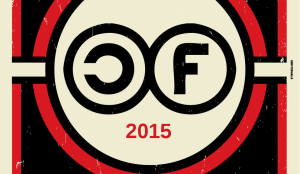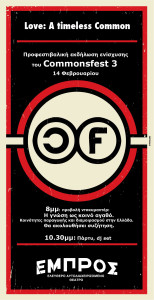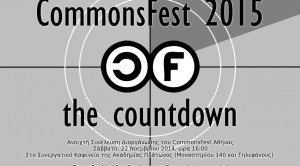Video: Drone shootings at Sarantaporo area in Greece for the upcoming documentary: “Building Communities of Commons in Greece”.
Fragment of an interview with Michael Hard on Common Wealth in June 2010 in Athens. ( Στα ελληνικά κάτω από την αγγλική εκδοχή).
I M: Could we say that the multitude can learn to institute and manage a world of Common Wealth? Is that possible?
M H: We certainly think so! One of our hypothesis is that the Common will be the central terrain of political straggle for the next period. And by the Common we mean two separate domains that are nonetheless related. In the one sense, by the Common we mean the earth, the water, the forest, the air and ecosystems which traditionally would be considered in a way common or potentially common. On the other hand, we mean the human creations that we were talking about before: ideas, images, languages, affects; which of course can be privatised, but they’re in fact less productive when they’re privatised. For example when information, knowledge become private it becomes less productive. Part of our argument then, is that the capitalist production is evermore oriented towards the Common, and yet, that Common Wealth that is constantly being created is resistant to and reacts against private accumulation. So you can see that the conflict between the private and the common in both of these domains, let’s say the ecological domain and the biopolitical domain – if I can call it that-, and in both of them it seems, either the private (like the management of private property) or the public (meaning state control and regulation) in both domains seems inadequate or to have failed and that what’s required instead is a self-management of the common and an organisation that allows for that open access and shared quality. I think there’s almost a general recognition that there has to be another terrain of political organisation.
I M: Practically, how could that be achieved today? Could it be through a kind of desertion, of disobedience, related to the concept of Exodus that you and Toni Negri have talked about [in your books]?
M H: Yes, the concept of Exodus (as a metaphor) that derives from the Jews’ exodus from Egypt. It’s an interesting example of political violence because Moses and the Jews are not fighting the Pharaoh: they just want to leave. It’s the Pharaoh that attacks them. And so it seems that, in a way, violence is required in this kind of Exodus; this kind of subtraction from the current form of domination. Like, when people ask if revolution has to be violent. Well, if it’s up to us to answer, then that answer is no, but they won’t let us go. So, the example of Exodus is relevant for two reasons: one is that part of this process is the process of this subtraction, of fleeing. The second is the role of violence in it: that flight requires a certain kind of defense, and that often does involve violence.
I M: Practically, how can that be applied today? What does Exodus mean practically today? Could it be read as an Exodus from the institutions?
M H: Yes, absolutely. Exodus would mean finding ways of (not necessarily confronting or destroying) evacuating certain relationships. Like when we were talking about the family before, I would read a lot of practices which seem to be progressive and beneficial as a kind of flight from, an evacuation from, the family structures and that, often, can be very violent itself. But then, the construction of new institutions is something I would insist on. The image of exodus and evacuation and subtraction seems to me rather useful in this rather than what seems to me an older dominant image of the need to assault and destroy the current forms of power structures. So rather the dynamic of confrontation with the police, with the state, with the capitalist powers, rather than confrontation, evacuation -which can involve different kinds of practices- is possible and preferred, it seems to me. Rather than imagining the political straggles as being that confrontation with power, rather creative – it could be artistic but it could also be other political forms- things that might have to be defended by the police, but they don’t need that at the first moment. In this sense it’s partly that metaphor of exodus.
Η Μ: Είναι ικανό το πλήθος να μάθει τρόπους να θεσμοθετήσει και να διαχειρίστεί την κοινοπολιτεία (common wealth)?
MH: Πιστεύω πως ναι. Μια από τις βασικές μας υποθέσεις είναι πως το δημόσιο θα αποτελέσει το επίκεντρο της πολιτικής πάλης για την επόμενη περίοδο. Και με τον όρο δημόσιο εννοούμε δύο διαφορετικούς τομείς οι οποίοι όμως συνδέονται. Ο ένας είναι ό,τι παραδοσιακά θεωρούμε κοινό, ή εν δυνάμει κοινό, όπως το νερό, τη γη ,τα οικοσυστήματα. Ο άλλος τομέας περιλαμβάνει τις ανθρώπινες δημιουργίες, ιδέες, εικόνες, γλώσσες και σχέσεις οι οποίες μπορούν φυσικά να ιδιωτικοποιηθούν αλλά τότε είναι λιγότερο αποδοτικές. Ένα απλό παράδειγμα είναι η πληροφορία ή η γνώση. Μέρος της επιχειρηματολογίας μας είναι πως η καπιταλιστική παραγωγή προσανατολίζεται όλο και περισσότερο προς το κοινό, όμως αυτός ο κοινός πλούτος που συνεχώς παράγεται αντιστέκεται και αντιδρά στην ιδιωτική συσσώρευση. Επομένως η αντιπαράθεση ανάμεσα στο ιδιωτικό -όπως η διαχείριση της ιδιωτικής περιουσίας- και στο δημόσιο –εννοώντας τον κρατικό έλεγχο- και στους δύο τομείς (τον οικολογικό και τον βιοπολιτικό) φαίνεται να είναι ανεπαρκής ή να έχει αποτύχει. Αντιθέτως αυτό που χρειάζεται είναι η αυτοδιαχείριση της κοινοπολιτείας και μια οργάνωση που να εξασφαλίζει ανοιχτή συμμετοχή και μοίρασμα των αξιών. Είναι ολοφάνερο πως υπάρχει μια καθολική αναγνώριση της ανάγκης να αλλάξει η βάση της πολιτικής οργάνωσης.
Η Μ: Πώς μπορεί να γίνει σήμερα κάτι τέτοιο? Σχετίζεται με την ανυπακοή, την αποχώρηση, δηλαδή με την ιδέα που εσείς και ο Νέγκρι αποκαλείτε Έξοδο?
Μ Χ_: Ναι η ιδέα της Εξόδου, σαν μεταφορά, που προέρχεται από την φυγή των Εβραίων από την Αίγυπτο είναι ένα καλό παράδειγμα για να περιγράψουμε την πολιτική βια. Γιατί ο Μωυσής και οι Εβραίοι δεν θέλουν να πολεμήσουν τον Φαραώ, θέλουν απλά να φύγουν. Ο Φαραώ τους επιτίθεται. Φαίνεται λοιπόν οτι η βία -αν και μη επιθυμητή- είναι αναπόφευκτη σ΄αυτό το είδος της Εξόδου, σε αυτή την αποχώρηση από την τότε μορφή κυριαρχίας. Οι άνθρωποι συχνά αναριωτιούνται αν η επανάσταση συνεπάγεται απαραίτητα βία. Ε λοιπόν, αν ήταν στο χέρι μας η απάντηση θα ήταν όχι, αλλά δεν θα μας αφήσουν ΄΄να φύγουμε΄΄. Το παράδειγμα της Εξόδου μου ταιριάζει για δύο λόγους. Ο ένας είναι πως περιλαμβάνει τη διαδικασία αποχώρησης και φυγής. Ο άλλος είναι ο ρόλος της βίας: αυτή η φυγή απαιτεί κάποια μορφή άμυνας που συχνά συμπεριλαμβάνει βία.
Η Μ: Πρακτικά πως μπορούμε να δούμε την Έξοδο σήμερα? Είναι μια Έξοδος από τους θεσμούς?
Μ Χ: Ναι απολύτως. Η Έξοδος θα απαιτούσε να βρούμε τρόπους -όχι απαραίτητα σύγκρουσης ή καταστροφής- εγκατάλειψης των καθορισμένων σχέσεων και θεσμών. Για παράδειγμα στην περίπτωση της οικογένειας που αναφέραμε νωρίτερα, θα μπορούσα να δω αρκετές χρήσιμες και επικοδομητικές πρακτικές για τη διαδικασία εκκένωσης των οικογενειακών δομών, αλλά και πάλι η διαδικασία από μόνη της μπορεί να είναι βίαιη. Ωστόσο η κατασκευή νέων θεσμών είναι κάτι στο οποίο, εγώ τουλάχιστον, θα επέμενα. Η εικόνα της Εξόδου και της αποχώρησης μου φαίνεται πιο χρήσιμη σ’ αυτό από την ως τώρα κυρίαρχη εικόνα της ανάγκης για επίθεση και καταστροφή των κατεστημένων δομών εξουσίας. Η αποχώρηση που περιλαμβάνει διάφορες πρακτικές είναι προτιμότερη από τη δυναμική της σύγκρουσης με την αστυνομία, το κράτος και τις καπιταλιστικές δομές. Πολιτικές αλλά και καλλιτεχνικές πρακτικές, που κάποιες φορές ίσως να αντιπαρατίθονται με την εξουσία αλλά χωρίς αυτό να συμβαίνει αναγκαστικά από την πρώτη στιγμή, είναι προτιμότερες. Αυτή είναι η μεταφορά της Εξόδου.



